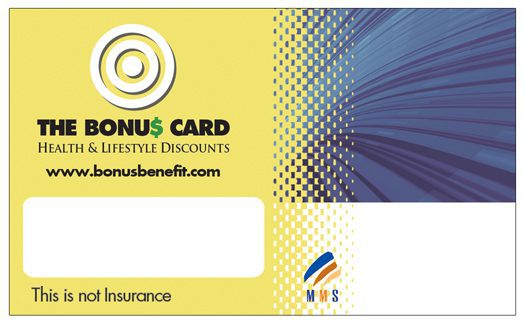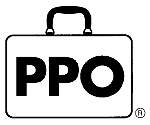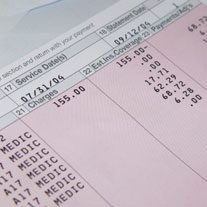
by admin | Aug 30, 2012 | Bonus Card, healthcare, individual health insurance, Wellness

CLICK & PRINT!
Use this link or print image below to begin using the FREE Pharmacy Card today.
With our Bonus Card the Rx discount is FREE and a great way to reinsure after all anyone can save you money by taking away benefits.

What can a Bonus Card card do for you?
Aside from the FREE Pharmacy Discount there added optional benefits. You get all the benefits below in one easy-to-use card for a low family rate of $9.95 or $14.95 per month.
Call a Doctor – Teladoc
Wouldn’t it be nice to just call a doctor when you need a prescription fast? Skip the office visit and wasted time in that germ-infested waiting room. Now, you can call a doctor 24/7/365 and get a prescription, if needed. Your Bonus Card health discount card gives you VIP access to our Teladoc service with fast treatment (within about 22 minutes, on average) for common ailments, from UTIs to pink eye. It’s like having a best friend who happens to be a doctor. Teladoc is just one of many services, including dental discounts, vision discounts and prescription discounts, all rolled into one easy-to-use health discount card. And, you get all this savings for one low monthly fee. There’s no risk with our 30-day, money back guarantee, so start saving time and money when you need to call a doctor to get a prescription (if needed).
Health Discount Card
Bonus Card is a health discount card that includes the ability to call a doctor 24/7 and get a prescription, if needed. It provides dental discounts at over 92,500 providers, vision discounts at over 12,000 providers and prescription discounts for prescriptions that are expensive or not covered by insurance. All that, rolled into one easy-to-use card! We know you’re busy and sometimes just need a prescription fast. You don’t have time to shop around for health discounts or a health discount card. Bonus Card gives you all these health services plus legal advice, identity theft protection and roadside assistance at one low price. You’ll love the time, money and frustration savings you’ll get with your very own Bonus Card health discount card.
 Your 24/7/365 Dr. BFF! It’s like having a best friend who’s a doctor! Did you know up to 70% of medical issues could be solved over the phone? Call a doctor (US-based) & get a prescription written, if needed. No additional cost…no kidding!
Your 24/7/365 Dr. BFF! It’s like having a best friend who’s a doctor! Did you know up to 70% of medical issues could be solved over the phone? Call a doctor (US-based) & get a prescription written, if needed. No additional cost…no kidding! 
 Two weeks after I received my discount card, I had a dental emergency. I was able to find a dental provider near our offices. The emergency that I experienced required that I have one tooth capped and another one filled. The discount card saved me $200.00.
Two weeks after I received my discount card, I had a dental emergency. I was able to find a dental provider near our offices. The emergency that I experienced required that I have one tooth capped and another one filled. The discount card saved me $200.00. 
Wood S. from CA Learn More
Use this link or print image below to begin using the FREE Pharmacy Card today.
)/images/NBDrugCard_template1.JPG)
Bonus Card – Pharmacy Discounts Only

by admin | Aug 14, 2012 | healthcare
 Bluecard PPO – Outside members home region, the PPO medical plan is known as BlueCard PPO. The BlueCard plan offers a network of quality doctors and hospitals known as the BlueCard Provider Network.
Bluecard PPO – Outside members home region, the PPO medical plan is known as BlueCard PPO. The BlueCard plan offers a network of quality doctors and hospitals known as the BlueCard Provider Network.
- freedom to seek care in-network or out-of-network;
- no need to select a primary care physician to coordinate your care;
- visit specialists directly — no referrals are required;
- no claim forms to submit when using an in-network provider;
- no balance bills when using an in-nework provider;
- wellness programs, including fitness reimbursement and discounts on alternative health care services, at no additional cost;
- enhanced programs to control and manage chronic conditions;
- preventive care for children and adults;
- enjoy in-network coverage anywhere in the United States when you use providers that participate in the Personal Choice or BlueCard PPO networks;
- worldwide coverage and recognition of the Blue Cross® symbol.
How Does it Work?
Blank Suitcase Logo
A blank suitcase logo on a member’s ID card means that the patient has Blue Cross Blue Shield traditional, POS, or HMO benefits delivered through the BlueCard Program.
“PPO in a Suitcase” Logo
You’ll immediately recognize BlueCard PPO members by the special “PPO in a suitcase” logo on their membership card. BlueCard PPO members are Blue Cross and Blue Shield members whose PPO benefits are delivered through the BlueCard Program. It is important to remember that not all PPO members are BlueCard PPO members, only those whose membership cards carry this logo. BlueCard PPO members traveling or living outside of their Blue Plan’s area receive the PPO level of benefits when they obtain services from designated BlueCard PPO providers.

How to Verify Membership and Coverage
Once you’ve identified the alpha prefix, call BlueCard Eligibility to verify the patient’s eligibility and coverage.
 | 1. Have the member’s ID card ready when calling. |
 | 2. Dial 1.800.676.BLUE. |
Operators are available to assist you weekdays during regular business hours (7am – 10pm EST). They will ask for the alpha prefix shown on the patient’s ID card and will connect you directly to the appropriate membership and coverage unit at the member’s Blue Cross Blue Shield Plan. If you call after hours, you will get a recorded message stating the business hours.
Keep in mind BCBS Plans are located throughout the country and may operate on a different time schedule than Anthem Blue Cross and Blue Shield. It is possible you will be transferred to a voice response system linked to customer enrollment and benefits or you may need to call back at a later time.
International Claims
The claim submission process for international Blue Cross and Blue Shield Plan members is the same as for domestic Blue Cross and Blue Shield Plan members. You should submit the claim directly to Anthem Blue Cross and Blue Shield.

by admin | May 30, 2012 | healthcare, Hospitals

Patients Waking Up To Major Colonoscopy Bill
The NYT article – Waking Up to Major Colonoscopy Bills illustartes what our clients are increasingly running into – increased out of pocket expenses.
“Patients who undergo colonoscopy usually receive anesthesia of some sort in order to “sleep” through the procedure. But as one Long Island couple discovered recently, it can be a very expensive nap. Both husband and wife selected gastroenterologists who participated in their insurance plan to perform their cancer screenings. … And in both cases, the Gastroenterologists were assisted in the procedure by anesthesiologists who were not covered by the couple’s insurance. They billed the couple’s insurance at rates far higher than any plan would reimburse — two to four times as high, experts say.”
Patients can go for Colonoscopies either in an outpatient medical office or in ambulatory hospital setting. Gastrointerologists cannot bill for the anesthesia unless there is an employed licensed Anesthesiologist on staff. The treating Physician cannot be the same person who administer/monitors the sedation. Generally speaking the Anesthesiologist in a hospital settings are separate entities and attempt to bill independently form the hospital charges. Now you can begin to see how patients are getting added billing.
Furthermore, we are seeing increasing out of network charges with Physicians dropping health plans in certain geographic areas as well as insurers shifting more of the costs burden.
The posting Out of Control Out of Network Charges points to examples such as – “a neurosurgeon charged $159,000 for an emergency procedure for which Medicare would have paid only $8,493.” Another example: “ a consumer went to an in-network hospital for gallbladder surgery with a participating surgeon. The consumer was not informed that a non-participating anesthesiologist would be used, and was stuck with a $1,800 bill. Providers are not currently required to disclose before they provide services whether they are in-network.” The average out-of-network radiology bill was 33 times what Medicare pays, officials say.
Our clients get 3 bills with any procedure needing general anesthesia
1) A bill from the hospital
2) A bill from the surgeon
3) A bill from anesthesia
Actually, the physician bill is typically the lowest cost of the bill . On a $5,000 total bill the GI may only get 10%. Sometimes the hospital and anesthesia charges are bundled into a single bill but many times they are not. On most plans patients can negotiate with the hospital depending on pre-authorization the anesthesia bill and resubmit charges. This is probably the most common appeal we perform on behalf of our clients.
Patient on a cost sharing plan with in-network deductibles may fair better with outpatient office colonoscopies. From an insurer costs perspective the charges in an office setting are typically $2,000-$2,500. So why do it in the hospital? The procedure may require general anesthesia and financial incentives. Also, at times the procedure may be a loss to the provider. For example, Pediatricians will not perform Gardasil vaccination because the vaccine costs more than what the pediatrician will get reimbursed to give it.
The vast majority of providers make sure that patients were in-network or arranged pre-payment plan prior to the procedure. As with most non-HMO plans, however, the responsibility rests with patient to make sure everything is pre-authorized and in network is possible.

by admin | Mar 12, 2012 | Health Care Reform, healthcare, Hospitals, PPACA, Small Business Group Health

Out of Control Out of Network Charges
Few healthcare changes have been more impacted than the out of control out of network charges billed to patients. The health care reform bill known as PPACA has for the most part been insignificant in the Northeast, in particular, as many state laws have already addressed issues such as pre-existing conditions, contraception, coverage rescissions and maximum loss ratios (MLR).
Instead, the market forces are reshaping the medical field into significant insurance & provider consolidation, larger hospital groups and flattening provider reimbursements. The problem is pointed out in Out of Network Medical Costs Affecting NY State Across investigation report commissioned by Governor Cuomo recognizing the unexpected out-of-network claim problem. Officials say that this is now “an overwhelming amount of consumer complaints.” Some examples cited in the report An Unwelcome Surprise – “a neurosurgeon charged $159,000 for an emergency procedure for which Medicare would have paid only $8,493.” Another example: ” a consumer went to an in-network hospital for gallbladder surgery with a participating surgeon. The consumer was not informed that a non-participating anesthesiologist would be used, and was stuck with a $1,800 bill. Providers are not currently required to disclose before they provide services whether they are in-network.” The average out-of-network radiology bill was 33 times what Medicare pays, officials say.
To make matters worse, Health Insurers have reduced their out of network recognized charges from private industry index UCR (usual customary and reasonable) to the Medicare Index known as RBRVS ( Resource Based Relative Value Scale ). Insurers moved away from UCR after then-NYS D.A. Mario Cuomo in 2009 forced Unitedhelatcare Group (owners of Inginex) to settle $50 Million in a conflict of interest allegation. D.A. Cuomo future hopes for UCR were to that it be overseen by a non-profit entity. So much for best laid plans.
Today, 90% of SMB members have in network only benefits but the few remaining consumers are paying for eroding out of network benefits with little transparencies and necessary protection from new out of network billing practices. The NY Dept of Financial services is calling for providers in non-emergency situations to disclose whether or not all services are in-network, what out-of-network charges will be and how much insurers will cover.
Insurers such as Aetna are taking action – with lawsuits throughout the country such as Aetna sues 9 N.J. doctors for “unconscionable” fees. Another Aetna lawsuit is discussed extensively in a law blog: In New Lawsuit, Health Insurers Allege Fraud and Kickbacks Against Out-of-Network Providers Who Forgive Patients’ Financial Responsibility.
In an ominous statement” “Failure to recognize this historical out-of-network avalanche will result in shocking financial disasters, as experienced by so many hospitals in 2003″

by admin | Jan 8, 2012 | Health Care Reform, healthcare, NY News, Small Business Group Health, State Exchanges

In the wake of Empire Blue Cross’s recent major SMB changes the 2 new Crains article below point to the early shake up results.
Tough Decisions on Health Coverage
Insurance Good Luck
Empire’s Small Group “simplification” did indeed cause groups to escape Empire’s rate increases and reduced plan selections. Additional, not mentioned in the article was that groups are facing plan modifications such as Rx changes switch to % from fixed $ copay and loss of Walgreen/Duane Reades chains. By being the largest insurer on the block heavy provider negotiations have been de rigieur as evidenced by loss of Westchester Medical Center for 14 months and counting.
Groups have been fortunate to find comparable alternatives despite these changes but we see little public evidence of concern form NYS legislature. We are not seeing the long term vision to open up markets to strong national insurance competitors. On the contrary we have deep concerns of allowing the past 2 non-profits of GHI and HIP merger and latest talks of going for profit.
Lastly, the article makes mention of possible “Health Exchanges” entering the market and lowering rates. Where is there evidence of this decrease? I’m not seeing why an insurer working in an oligopoly environment with price controls would be motivated to lower rates. Would Con Ed or Blue Bell lower rates in the 70s because now SMB can shop online??

by admin | Dec 22, 2011 | healthcare, NY News

In a pleasant surprise, Empire will delay their April 2012 decision to “simplify” small group plans 1 more year from April 2012 to April 2013 instead. The Nov 4th Empire announcement to leave the NY Small Group Business was truly shocking after being in business for 75 years and insuring 35% of the market.
What this means for consumers is that insured members will now breath a sigh of relief and keep their contracted plan at least until their renewal. Evidentially, Empire was allowed to abruptly do a “hard shut down of their plans” for April and not allow a group to complete their 12 month contract. The negative consequence would have affected many unfairly as most members today have some kind of annual deductible and/or coinsurance on Rx plans, hospitalizations and surgeries. Example: a member signs up for a plan Oct 1 and has already met their deductible responsibilities would suddenly have to now change plans on April 2012. and start all over again.
A point needing further explanation is are they or they not exiting? Empire is stating that they are not in fact leaving but merely simplifying their offering to 6 plans but this is actually a red herring as the plans offered are not market friendly and allows Empire to stay within the market without having to really exit. Example: Their HMO monthly rate is $675/single when you can get the same plan from a leading competitor for $465/single.
So why be in the market without actually being in the market? The state’s regulation would not permit an insurer to re-enter for 3 years. With Health Care Reform changes in the subsequent years there are variables that may help NYS such as add’l federal funding. Additionally, it is an election year and with many unknown Health Care Reform variables still evolving such as Supreme Court hearing on individual mandate by June 2012 – WSJ Supreme Test for Health Law.
Either way this is welcome news to our existing clients and for the marketplace at large however short term it is.
Happy Holidays!!
[polldaddy poll=5783128]
Error: Contact form not found.



 Your 24/7/365 Dr. BFF! It’s like having a best friend who’s a doctor! Did you know up to 70% of medical issues could be solved over the phone? Call a doctor (US-based) & get a prescription written, if needed. No additional cost…no kidding!
Your 24/7/365 Dr. BFF! It’s like having a best friend who’s a doctor! Did you know up to 70% of medical issues could be solved over the phone? Call a doctor (US-based) & get a prescription written, if needed. No additional cost…no kidding! 
)/images/NBDrugCard_template1.JPG)









